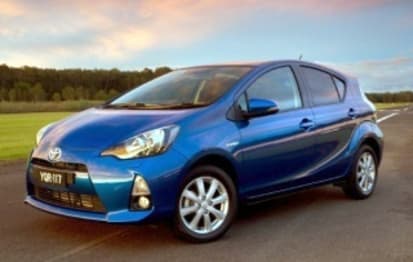
The Toyota Prius C 2014 is priced from $14,950 for Hatchback Prius C I-Tech Hybrid.
The Toyota Prius C 2014 is available in Hybrid with Regular Unleaded.
Hatchback
| Toyota Prius C Models | SPECS | PRICE |
|---|---|---|
| Hybrid | 1.5LHyb/ULPHybrid with Regular UnleadedCVT AUTOCVT auto | $9,790 – 13,420 |
| I-Tech Hybrid | 1.5LHyb/ULPHybrid with Regular UnleadedCVT AUTOCVT auto | $10,230 – 13,970 |
Toyota Prius C 2014 FAQs
Check out real-world situations relating to the Toyota here, particularly what our experts have to say about them.
-
What would be a good hybrid to replace a Toyota Prius C?
It’s probably quicker and simpler to tell you what passenger and SUV hybrids Toyota DOES sell in Australia (as well as reducing the chance of missing some obscure, foreign-market variant). So, right now, that list is made up of the Toyota Yaris Cross, C-HR, Corolla Cross, RAV4, Kluger, Yaris, Camry and Corolla (the latter in both hatch and sedan formats).
It’s a bit surprising to find you’re having trouble getting parts for a Prius C as this model was sold here by Toyota between 2012 and 2020. It was more or less replaced by the Yaris Hybrid, or at least that’s how many buyers saw it. Toyota has one of the biggest dealership networks in the country as well as plenty of dealers in regional areas, and that remains one of the brand’s strengths as far as servicing and parts supply goes. By the way, now that that all new cars sold in Australia are imported, nearly all spare parts beyond normal servicing items (filters, belts etc) will also be imported.
Show more -
Was there a recall on the 2013 Toyota Prado?
This is a pretty well known problem with the three-litre turbo-diesel that Toyota was fitting to Prados between 2009 and 2014. The problem began when Toyota redesigned the pistons of the engine to help it achieve Euro 4 emissions standards. Earlier versions of the motor that didn’t comply with Euro 4 did not have the same problem.
The piston cracking most commonly occurs once the engine has covered something like 100,000km or 150,000km. It was also most likely to occur in engines that had been modified to produce more turbo-boost or vehicles that had been used for extended periods of towing heavy loads.
Toyota did issue a service bulletin for the problem and began fitting post-2014 engines with different fuel injectors and a revised piston design. Piston failures in these later engines are rarer but still not entirely unknown. Even though a service bulletin was issued, Toyota did not issue a recall for the affected vehicles.
Show more -
How to charge a Toyota bZ4X (how much does it cost & how long does it take)?
There are three ways of charging the Toyota bZ4X – two at home and one in public. The first is the cheapest albeit slowest method and uses a standard 240V powerpoint with the charging cable provided by Toyota. The 71.4 kWh battery with 64kWh of usable capacity takes 30 hours to charge from 10 per cent to 100 per cent, with average energy prices in Australia costing between 21 to 36 cents per kWh. Prices can depend on demand and which state you live in, though. Alternatively, owners can install an AC wall charger through a licensed electrician. On average, the cost of these ranges from anywhere between $800 and $2000, with additional charges to install. A 7kW unit will deliver 10 to 100 per cent charging in 10 hours, while an 11kW unit will deliver a 10 to 100 per cent charge in 6.5 hours. The cost to charge can be free if your unit is hooked up to solar power. Finally, a public DC charging station will deliver a charge of 10 to 100 per cent at the bZ4X’s maximum capacity of 150kW in approximately 45 minutes. Charges depend on demand and time of day, but as a general rule you should never pay more than $40.
Show more


 Kia Cerato
Kia Cerato